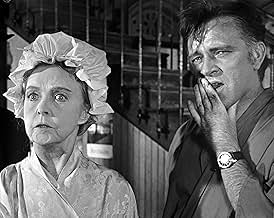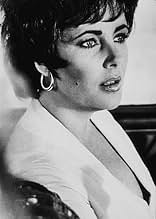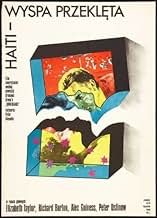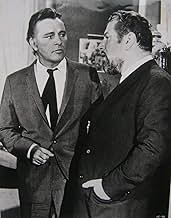IMDb RATING
6.2/10
2.4K
YOUR RATING
A cynical Welsh hotel owner secretly romances a diplomat's wife in Haiti, under the violent reign of the despot "Papa Doc" Duvalier.A cynical Welsh hotel owner secretly romances a diplomat's wife in Haiti, under the violent reign of the despot "Papa Doc" Duvalier.A cynical Welsh hotel owner secretly romances a diplomat's wife in Haiti, under the violent reign of the despot "Papa Doc" Duvalier.
- Awards
- 3 wins & 1 nomination total
Thomas Baptiste
- Haitian Soldier
- (uncredited)
Make Bray
- Haitian Soldier
- (uncredited)
Robin Langford
- Angelito Pineda
- (uncredited)
Dennis Alaba Peters
- César
- (uncredited)
Featured reviews
A ship of fools docks in Port-au-Prince, and the disembarking passengers include a local businessman, an idealistic former U.S. presidential candidate and his wife, and a self-confident British major. The film's credentials are incredible; the cast includes Richard Burton, Elizabeth Taylor, Alec Guiness, Peter Ustinov, Lillian Gish, and James Earl Jones; Graham Greene wrote the script from his own novel; and Peter Glenville provided the taut direction. Given the talent involved, perhaps expectations raised the bar for "The Comedians" too high for any film to reach. Although the results do not represent a pinnacle for any of these artists, "The Comedians" is an engrossing tale set against the nightmarish backdrop of Papa "Doc" Duvalier's repressive regime in Haiti. A thick tense atmosphere envelops the film from the outset. Arrests, beatings, corpses, intimidation, bribes, murders, and threats paint Duvalier's Haiti in shades of blood and terror. In 1967, the Taylor-Burton romance was still in the tabloids, and the film's illicit romance depicted by the world-famous pair was still titillating. However, time has dimmed the scandal, and the film has benefited. Greene's story and the acting talent are no longer over-shadowed.
The still ravishing Taylor, who affects a German-accent as the wife of Ustinov, a cuckolded foreign ambassador, is involved with Burton, a local hotel owner. While arguably the least-interesting aspect of the film, their liaison is integral to the story. Meanwhile, Paul Ford and his wife, Gish, seek to establish a vegetarian center in Duvalierville, a never-will-be Utopian community, and a shady braggart with the wrong connections, Guinness, attempts an arms sale to Duvalier's henchmen. The visitors, the diplomats, and their local connections are embroiled in Haitian political conflicts and dangerous encounters with Duvalier's thugs, the dreaded Tonton Macoute.
Greene's script is literate, and the performances are effective. The bevy of international stars is enhanced and ably supported by such pros as Paul Ford, Cicely Tyson, Raymond St. Jacques, Roscoe Lee Browne, and George Stanford Brown. Although short on action, "The Comedians" is long on suspense and tension. While the film certainly remains a staple for fans of Taylor and Burton, Glenville's fine production deserves to be seen and appreciated, not only for its lustrous stars, but also for throwing a spotlight on Haiti's nightmarish past.
The still ravishing Taylor, who affects a German-accent as the wife of Ustinov, a cuckolded foreign ambassador, is involved with Burton, a local hotel owner. While arguably the least-interesting aspect of the film, their liaison is integral to the story. Meanwhile, Paul Ford and his wife, Gish, seek to establish a vegetarian center in Duvalierville, a never-will-be Utopian community, and a shady braggart with the wrong connections, Guinness, attempts an arms sale to Duvalier's henchmen. The visitors, the diplomats, and their local connections are embroiled in Haitian political conflicts and dangerous encounters with Duvalier's thugs, the dreaded Tonton Macoute.
Greene's script is literate, and the performances are effective. The bevy of international stars is enhanced and ably supported by such pros as Paul Ford, Cicely Tyson, Raymond St. Jacques, Roscoe Lee Browne, and George Stanford Brown. Although short on action, "The Comedians" is long on suspense and tension. While the film certainly remains a staple for fans of Taylor and Burton, Glenville's fine production deserves to be seen and appreciated, not only for its lustrous stars, but also for throwing a spotlight on Haiti's nightmarish past.
I saw this movie many years ago and it left me cold. When it came up again on cable, the combination of the stellar cast - Alec Guinness, Richard Burton, Peter Ustinov, Peter Ford, Lillian Gish, James Earl Jones, Liz Taylor - and a script based on a Graham Greene novel, prompted me to give it a second look. Maybe because I'm a lot older now I can appreciate its many qualities. Graham Greene's cynical, post-Catholic sensibility is clearly in evidence here. The production qualities are high, and the story line is engaging. The portrayal of the misery of Haiti and the terror of the Duvalier government with its tontons macoutes secret police, is chilling. It is still true today that if you look up "Third World Hell Hole" in your Funk & Wagnalls, there will be a picture of Haiti. The characters are well-drawn. Burton's character, Brown - who seems to be missing a first name - is a sardonic, cynical and jaded hotel owner who puts one in mind of Rick in Casablanca. His character transformation, involving the shedding of his cynicism, is very effectively portrayed. Mr. & Mrs. Smith (Ford / Gish) might have been portrayed to be the slightly silly and naive characters they appear to be, but in the end they demonstrate a touching bravery and idealism. The weak spot here is Elizabeth Taylor's Martha Pineda. Her attempt, as an ambassador's European wife, at an accent is simply ridiculous, ranging from French (sorta), to British, to German (kinda) depending on the scene. In addition, the film makers decided that extra dollops of Rich and Liz's lovemaking scenes would be an added draw; not a good idea, as they slow down the action and force us to endure listening to Taylor. It's a long movie but it keeps us going to its tragic finale.
Burton, Taylor, Guinness, and Ustinov are a heady combination but I will not remember the film for any one of their "acting" capabilities as much as the four wonderful main characters woven by Graham Greene and Peter Glenville. There is almost an unrecognizable James Earl Jones whose fabulous voice is overshadowed in this film by those of Burton and the suave Guinness.
"I have no faith in faith," rants Brown (Burton) the anti-hero of the film--a typical Greene character (compare with Greene's 'The Burnt-out case'). Cynicism is turned into comedy. The splashes of Catholic motifs made in passing reference ("defrocked priest") hark back to Burton's earlier role in "Night of Iguana." Guinness' reference to looking like a "Lawrence of Arabia" recalls his own role as Prince Faisal in Lean's movie. Not having read Greene's book, I am not sure whether Greene introduced these clever details into the script to suit the actors or whether the details had previously existed in the book.
The gradual unmasking of the Major (Guinness) is a treat creatively captured by Glenville and Greene. The final speech made by Burton to his group of ragged rebels seem to have a common "comic" thread with George Clooney's speech to his soldiers towards the end of the recent Mallick's "The Thin Red Line".
Ustinov's diplomat and Taylor's vulnerable diplomat's wife, who admits to her lover that he is the fourth "adventure," are both comedians--Greene's likable misfits who cannot change their destiny and are strangely reconciled to accept their inevitable end. All the four main characters are "prepared" for their destiny they have designed for themselves as a consequence of previous actions in life. The closing shot of the film is a shot of a suggestive blue sky, redeeming the foibles of the comedians on terra firma.
I admit that when I saw the film some 20 years ago, I did not appreciate the film as I do now. I was missing the forest for the trees. This film does not belong to Burton, Taylor, Guinness, Ustinov, Jones or Lillian Gish. It belongs to Greene, Glenville and the French cinematographer Henri Decae.
I do not imply that Burton was not good--but George C Scott said one should evaluate a performance by remembering the character more than the actor. It is in that context that I remember the four main characters. Burton's kisses are different here than say in "Boom" or "Cleopatra"--only to add detail to the character. Taylor is strangely subdued only to add power to her smoldering role. Guinness gradual unmasking is pathetic yet endearing only to add more substance to the character. Decae's camera captures details that shocks--e.g., empty drawers in desks to collect bribes, public executions of rebels watched by school kids...
I am surprised that this film, to my limited knowledge, has never been taken seriously for what it offers--a superb script, commendable acting, good direction, and some fine camera-work.
"I have no faith in faith," rants Brown (Burton) the anti-hero of the film--a typical Greene character (compare with Greene's 'The Burnt-out case'). Cynicism is turned into comedy. The splashes of Catholic motifs made in passing reference ("defrocked priest") hark back to Burton's earlier role in "Night of Iguana." Guinness' reference to looking like a "Lawrence of Arabia" recalls his own role as Prince Faisal in Lean's movie. Not having read Greene's book, I am not sure whether Greene introduced these clever details into the script to suit the actors or whether the details had previously existed in the book.
The gradual unmasking of the Major (Guinness) is a treat creatively captured by Glenville and Greene. The final speech made by Burton to his group of ragged rebels seem to have a common "comic" thread with George Clooney's speech to his soldiers towards the end of the recent Mallick's "The Thin Red Line".
Ustinov's diplomat and Taylor's vulnerable diplomat's wife, who admits to her lover that he is the fourth "adventure," are both comedians--Greene's likable misfits who cannot change their destiny and are strangely reconciled to accept their inevitable end. All the four main characters are "prepared" for their destiny they have designed for themselves as a consequence of previous actions in life. The closing shot of the film is a shot of a suggestive blue sky, redeeming the foibles of the comedians on terra firma.
I admit that when I saw the film some 20 years ago, I did not appreciate the film as I do now. I was missing the forest for the trees. This film does not belong to Burton, Taylor, Guinness, Ustinov, Jones or Lillian Gish. It belongs to Greene, Glenville and the French cinematographer Henri Decae.
I do not imply that Burton was not good--but George C Scott said one should evaluate a performance by remembering the character more than the actor. It is in that context that I remember the four main characters. Burton's kisses are different here than say in "Boom" or "Cleopatra"--only to add detail to the character. Taylor is strangely subdued only to add power to her smoldering role. Guinness gradual unmasking is pathetic yet endearing only to add more substance to the character. Decae's camera captures details that shocks--e.g., empty drawers in desks to collect bribes, public executions of rebels watched by school kids...
I am surprised that this film, to my limited knowledge, has never been taken seriously for what it offers--a superb script, commendable acting, good direction, and some fine camera-work.
The Comedians one of the many films that starred that legendary screen team of the 60s, husband and wife Richard Burton and Elizabeth Taylor is set in that troubled stepchild of the western hemisphere Haiti. At the time Haiti was mired in the worst poverty on this side of the globe with the overwhelmingly brutal dictatorship of Papa Doc Duvalier. Duvalier and his family are gone now, but the brutality and poverty remain.
The title from the original Graham Greene novel refers to the various white people here who are very different, but who handle what they see in Haiti by making a lot of bad jokes. Whatever else this is, The Comedians is not a comedy.
Burton and Taylor play the owner of a hotel in Port-Au-Prince and she is the wife of an ambassador from some foreign country unnamed. They're having an affair, she's married to Peter Ustinov. Paul Ford and Lillian Gish are a husband and wife and he once ran for president on the Vegetarian Party ticket. He wants to start a business, a vegetarian resort of sorts. These two are totally clueless, but so are the Haitians they deal with, they actually treat Ford like a big deal.
Alec Guinness plays a part similar to the part David Niven had in Separate Tables, he's an arms dealer who's been dealing with someone now out of favor with the regime. But while at first he's clapped in prison Guinness makes a deal with another faction who think he's a big deal with his heralded background of being a war hero in the Burmese campaign in World War II. If you've seen Separate Tables than you can equate Guinness with Niven.
These name players however take a back seat to some of the black performers in The Comedians. Roscoe Lee Browne, Cicely Tyson, Gloria Foster, Georg Stanford Brown all are different types of Haitians from different levels of society there. But the guy to really watch is Raymond St. Jacques. As a captain in Duvalier's police he is one truly malevolent being. St. Jacques steals all the scenes he's in.
Of course Papa Doc didn't allow The Comedians to be shot in Haiti, but the country of Dahomey one of the new African Republics served well as a place with a poverty level similar to Papa Doc's little satrapy. The Comedians which was not a big hit at the time is maybe more relevant today as we can see things there without the filter of the Cold War between two superpowers.
Liz and Dick did a good one here, one for the ages.
The title from the original Graham Greene novel refers to the various white people here who are very different, but who handle what they see in Haiti by making a lot of bad jokes. Whatever else this is, The Comedians is not a comedy.
Burton and Taylor play the owner of a hotel in Port-Au-Prince and she is the wife of an ambassador from some foreign country unnamed. They're having an affair, she's married to Peter Ustinov. Paul Ford and Lillian Gish are a husband and wife and he once ran for president on the Vegetarian Party ticket. He wants to start a business, a vegetarian resort of sorts. These two are totally clueless, but so are the Haitians they deal with, they actually treat Ford like a big deal.
Alec Guinness plays a part similar to the part David Niven had in Separate Tables, he's an arms dealer who's been dealing with someone now out of favor with the regime. But while at first he's clapped in prison Guinness makes a deal with another faction who think he's a big deal with his heralded background of being a war hero in the Burmese campaign in World War II. If you've seen Separate Tables than you can equate Guinness with Niven.
These name players however take a back seat to some of the black performers in The Comedians. Roscoe Lee Browne, Cicely Tyson, Gloria Foster, Georg Stanford Brown all are different types of Haitians from different levels of society there. But the guy to really watch is Raymond St. Jacques. As a captain in Duvalier's police he is one truly malevolent being. St. Jacques steals all the scenes he's in.
Of course Papa Doc didn't allow The Comedians to be shot in Haiti, but the country of Dahomey one of the new African Republics served well as a place with a poverty level similar to Papa Doc's little satrapy. The Comedians which was not a big hit at the time is maybe more relevant today as we can see things there without the filter of the Cold War between two superpowers.
Liz and Dick did a good one here, one for the ages.
Based on the novel by Graham Greene, The Comedians is a look at Haiti that nearly 40 years later remains the same - political unrest, poverty, corruption, and brutality.
Set during the time of Papa Doc, the story centers on Richard Burton as the white owner of a hotel left to him by his mother. He is in love with the wife (Elizabeth Taylor) of an ambassador (Peter Ustinov) and has managed to remain apolitical. However, events force him to enter the fray.
The Comedians holds one's interest, although it's on the long side. The cast is remarkable: Burton, Alec Guinness, Peter Ustinov, Taylor, James Earl Jones, Lillian Gish, Georg Stanford Brown, Roscoe Lee Brown, and, in a small role, Cicely Tyson.
Taylor is very beautiful, although her accent is all over the place. She sounds French in the beginning, then English, then like Elizabeth Taylor, and then in the middle of the movie, we find out she's German.
Though Burton went the schlock for cash route in his career, he was a wonderful, handsome actor with a remarkable voice. Towards the end of the film, he has a scene with Guinness that is well worth the wait - two great actors in a subdued and remarkable scene.
The Haitian scenery belies what lies underneath. It's a film that is perhaps more timely today than it was in 1967.
Set during the time of Papa Doc, the story centers on Richard Burton as the white owner of a hotel left to him by his mother. He is in love with the wife (Elizabeth Taylor) of an ambassador (Peter Ustinov) and has managed to remain apolitical. However, events force him to enter the fray.
The Comedians holds one's interest, although it's on the long side. The cast is remarkable: Burton, Alec Guinness, Peter Ustinov, Taylor, James Earl Jones, Lillian Gish, Georg Stanford Brown, Roscoe Lee Brown, and, in a small role, Cicely Tyson.
Taylor is very beautiful, although her accent is all over the place. She sounds French in the beginning, then English, then like Elizabeth Taylor, and then in the middle of the movie, we find out she's German.
Though Burton went the schlock for cash route in his career, he was a wonderful, handsome actor with a remarkable voice. Towards the end of the film, he has a scene with Guinness that is well worth the wait - two great actors in a subdued and remarkable scene.
The Haitian scenery belies what lies underneath. It's a film that is perhaps more timely today than it was in 1967.
Did you know
- TriviaSeveral critics noted that the ending of this movie is at least a little more positive and optimistic than the bleak ending of Graham Greene's original novel, and attacked the movie for "softening" the subject. Greene, however, insisted that the more upbeat ending had been his own idea.
- GoofsIn the last few shots in the movie, as Petit Pierre (Roscoe Lee Browne) is leaving the airport, there is initially a departing Vickers VC10 airliner flying overhead from right to left, this changes to a close up, followed by a shot of the same airliner now flying into the distance - unfortunately this is different 4 engine Jetliner.
- Quotes
Brown: I don't believe in causes.
Dr. Magiot: The role of cynic doesn't really suit you, Brown.
Brown: I don't believe in play-acting either.
Dr. Magiot: You imagine because you've lost one faith, you've lost all? You're wrong, Brown. There is always an alternative to the faith we lose.
Brown: I have no faith in faith.
- ConnectionsFeatured in The Comedians in Africa (1967)
- How long is The Comedians?Powered by Alexa
Details
Box office
- Gross US & Canada
- $5,200,000
- Runtime
- 2h 30m(150 min)
- Sound mix
- Aspect ratio
- 2.35 : 1
Contribute to this page
Suggest an edit or add missing content




































